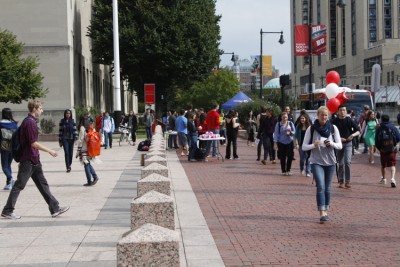
One hundred sixty private higher education institutions have failed the U.S. Department of Education’s financial responsibility test, according to a Friday analysis conducted by The Chronicle of Higher Education.
Boston University passed the financial responsibility test and was awarded a perfect score of three, according to the DOE’s Financial Responsibility Composite Scores. The Chronicle analysis also stated that 94 out of the failed institutions are nonprofit, while the remaining are for-profit.
The scores, ranging from minus one to three, were based on an analysis of the primary reserve ratio, equity ratio and net income ratio from a specific institution’s 2013-14 financial data. Scores below 1.5 are equivalent to a failing grade.
The ratios aim to gauge “fundamental elements of the financial health of an institution, not the educational quality of an institution,” according to the Federal Student Aid website.
BU spokesperson Colin Riley said the score is an indicator of a school’s efficiency and accountability in spending federal money on students who are in need of financial aid.
“[The score] is done to ensure that the federal government has confidence in the ability of schools to manage the funds that student receive through the federal government,” Riley said. “The federal government wants to be assured that when that money goes to the university for [a] student, [and] if for some reason that student doesn’t enroll, the money is able to come back and [be] accounted for properly.”
Riley said more than 50 percent of undergraduate students receive need-based federal aid at BU. He added that receiving federal funding and providing students with financial aid is “a challenge” that the university overcomes “very well.”
“We’re a tuition-dependent school, and we’re a very competitive school,” Riley said. “The average student at BU would get around [$6,000] to $7,000 of federal student loans if they’re eligible.
Jay Halfond, a professor in the Metropolitan College, said BU has a favorable reputation for its money management.
“Boston University is among a large number of well-known, highly regarded institutions in sound fiscal health … based on its savings, equity and income,” Halfond said. “Since [the test] covers both for-profit and not-for-profit private institutions, those in financial difficulty tend to be lesser known, often proprietary schools.”
The scores given are important because they concern public money that is given to many institutions that do not use the money efficiently, Halfond explained.
“Still, this is troubling from a taxpayer perspective, since our money is going to support the financial aid of failing schools,” Halfond said. “What is important about this test is its basis in objective, audited information, not subjective impressions or easily manipulated data. So it is clear that BU is financially solid based on its savings, equity and income.”
One of the schools deemed inadequate was the Bay State School of Technology, which received a 1.3 composite score.
Bay State has scored below the requirements for two years in a row, forcing its financial department to modify the way the institution receives and disperses financial aid, said Larry Fay, the school’s director of financial aid. Bay State’s main issue was enrollment, which affected the income and composite score of the school.
“We’ve done a lot of work to turn that score around,” Fay said. “We just had our [certified public accountants] do a half-year projection based on the period from July 1 to Dec. 31, 2015, and based on those calculations, we’d be out of the danger zone.”
Several BU students said they were surprised by the perfect score BU received, as they have been wary of BU’s financial aid.
Aleia Lebowitz, a senior in the College of Fine Arts, said she does not see BU as an institution generous with financial aid.
“I didn’t receive any financial aid at BU, and I was hoping for something,” she said. “I’m Native American and I was looking at a lot of schools that gave scholarships to Native American students, and BU doesn’t give any, so that was disappointing. I don’t know if they give out full packages instead of spreading out the wealth, but I’m surprised by [the score].”
Ramona Hihn, a second-year doctoral student in the Graduate School of Arts and Sciences, said different programs have noticeably different financial abilities.
“Ph.D. students make $32,000 at BU, and even though Boston is expensive, we can definitely live on that,” she said. “If you’re a master’s student … you make way less money for the same job and you also don’t get a scholarship, so the program is not that great.”
However, Olivia Soledad, a freshman in the College of Arts and Sciences, took a different stance. She said she chose to attend BU based on the generous financial aid package BU awarded her.
“I’ve heard a lot of people who couldn’t get aid,” she said. “Based off my own experience, I’m not surprised [about the score] at all.”























































































































